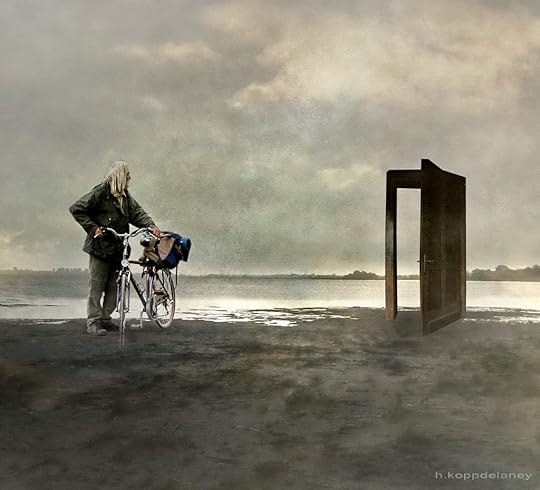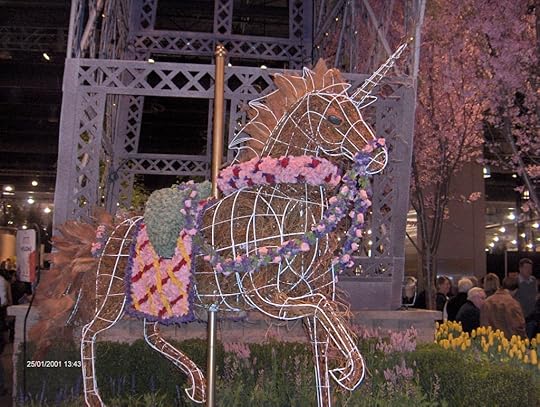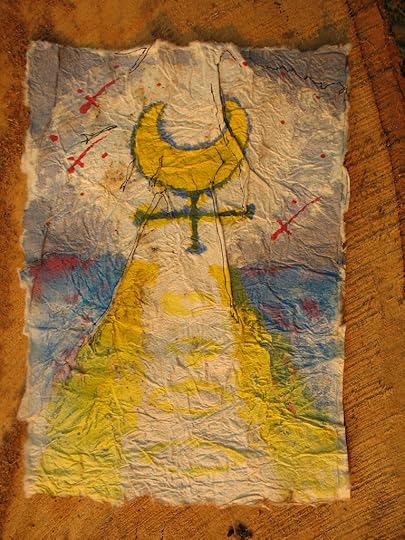Robin Helweg-Larsen's Blog, page 45
May 22, 2023
Gail White, ‘Money Song’

Money won’t buy you the moon and stars,
but trips abroad and enormous cars
and fancy drinks in exclusive bars,
can all be purchased with money.
Money won’t buy you wisdom and truth
or permanent beauty or lasting youth,
but it makes a very good substituth,
which makes it nice to have money.
The dog and the cat that you adore–
money won’t make them love you more,
but it keeps the wolf away from the door,
which is why I wish I had money.
I’d have a fabulous London flat,
a house in Provence and a Persian cat,
and I’d give up being a Democrat,
if only I had enough money.
When all the sins of excessive wealth
had left me ruined, by speed or stealth,
I’d still have memories of my health,
and the fun I had with my money.
*****
Gail White writes: “I wrote the poem as a sort of updating of Arthur Clough’s ‘Spectator ab Extra‘, which has the refrain line ‘How pleasant it is to have money.’ Some things never change.”
Gail White is the resident poet and cat lady of Breaux Bridge, Louisiana. Her books ASPERITY STREET and CATECHISM are available on Amazon. She is a contributing editor to Light Poetry Magazine. “Tourist in India” won the Howard Nemerov Sonnet Award for 2013. Her poems have appeared in the Potcake Chapbooks ‘Tourists and Cannibals’, ‘Rogues and Roses’, ‘Families and Other Fiascoes’, ‘Strip Down’ and ‘Lost Love’. ‘Money Song’ is collected in ‘Asperity Street‘. Her new light verse chapbook, ‘Paper Cuts‘, is now available on Amazon.
Photo: “Crowne-Gold-Silver-Bullion” by digitalmoneyworld is licensed under CC BY 2.0.
May 20, 2023
Short poem: ‘Avalanche’

I wandered nowhere special in my past,
just drifted, looking, lonelyish, half-arsed.
Nor in my present is there brilliant light–
I drift, doze, dream, enjoy the day and night.
What then will help me through a magic door?
Sensing the future’s avalanche downroar.
*****
This was published a couple of months ago in Snakeskin. Thanks, George Simmers!
“The Magic Door” by h.koppdelaney is licensed under CC BY-ND 2.0.
May 17, 2023
Poem: ‘And, If I Could’

And, if I could, I’d sing my love with unicorns in chains of flowers,
With endless oceans greyly battering by misty moors,
With joyful hunting dogs with muddy paws,
With soft spring showers –
With anything eternal, wistful, happy, sad.
But all my dogs inside are snapping, yapping, mad,
My showers are wintry, my sea-shores are lined
With unkind tourists drinking bourbon,
And unicorns are dead, and flowers suburban.
And, if I could, I’d steal my love on midnight horse and overseas,
To city-sacking buccaneering round the reckless earth,
Settle at last to farm some quiet firth:
Goats, orchards, bees;
Explosive starts, wild-beating hearts, and peace at last.
But ungeared fantasies spin lies torn from the past:
I’m a slum-quarter city-sprouting weed,
My planted seeds die in deserted gardens,
My wandering’s my weak will; and my heart hardens.
And, if I could, I’d love my love with wayside flowers, fresh fruit, a kiss,
With secondhand-in-hand shops’ dazzling, puzzling oddities,
With evening at the theater or a fair,
With wordless stare,
With dreams and smiles, and laughter at my foolishness.
But all my city streets are drizzle and drains, not bliss;
Traipsing to shows and shops is soul-destroying,
And, toying with my rural lie,
Commitment-scared, I flee the searching Eye.
And, if I could, I’d give my love all children, chosen and our own:
Their love – their moody silences – their smiles like wind and sun –
Their seashell searching – riots – sense of fun –
Pregnant to grown
We’d share kaleidoscope Life’s spectrum-brilliant rays.
But I drift unfamiliar down decaying days
Where trees are concrete and the ground is stone,
Bemoan I knew but left that love…
And, if I could, you know I’d have my love.
*****
This is a poem from my 20s, when I was more skilled at the creation of nonce forms. Formal poetry was essentially unpublishable at the time; decades later, this poem has just been published in David Stephenson’s Pulsebeat Poetry Journal.
“File:Philadelphia Flower Show 2011 Unicorn of flowers HPIM4354.jpg” by Mary Mark Ockerbloom is licensed under CC BY-SA 4.0.
May 6, 2023
Maryann Corbett, ‘Dissonance’

We dress ourselves
from the Goodwill store
since Art has kept us
genteelly poor
and we laugh together
at how we’ve slummed
amid vocalises
and arias hummed
and the mirth for both of us
seemed sincere
so I joked, where others
would overhear,
about our finds
in the plaids and prints
and saw you wince.
*****
Maryann Corbett writes: “Perhaps every poem that seems to portray one small moment is really a goulash of hundreds of moments. That’s certainly true of ‘Dissonance‘. There really was a friend who was a fellow singer, fellow poet, and fellow fan of the bargains to be found in charity shops. And there really was an awkward moment when I misjudged her feelings about artistic penury, a penury I’d escaped in a very un-artistic job. But folded into the writing of the poem were all my student years, years when I was much younger, much poorer, and much more in solidarity with friends still following their dreams.”
‘Dissonance‘ was first published in Mezzo Cammin, and gave its name to a 2009 chapbook collection published by Scienter Press.
Maryann Corbett earned a doctorate in English from the University of Minnesota in 1981 and expected to be teaching Beowulf and Chaucer and the history of the English language. Instead, she spent almost thirty-five years working for the Office of the Revisor of Statutes of the Minnesota Legislature, helping attorneys to write in plain English and coordinating the creation of finding aids for the law. She returned to writing poetry after thirty years away from the craft in 2005 and is now the author of two chapbooks and five full-length collections. Her work has won the Willis Barnstone Translation Prize and the Richard Wilbur Award, has appeared in many journals on both sides of the Atlantic, and is included in anthologies like Measure for Measure: An Anthology of Poetic Meters and The Best American Poetry. Her sixth book, The O in the Air, is forthcoming from Franciscan University Press.
Photo: “Goodwill outlet store” by sparr0 is licensed under CC BY-SA 2.0.
May 1, 2023
Using form: Susan McLean, ‘Cul-de-Sac’

The man who had a perfect lawn
forced his three kids to toil outside
till every dandelion was gone.
His wife, gentle and put-upon,
dusted the trophies of his pride
(for tennis, not his perfect lawn).
His son, advancing like a pawn
to keep his father satisfied,
chose, when his girl and job were gone,
to hit a bridge (or gun) head-on.
The neighbors whispered “suicide”
while walking past that perfect lawn.
The youngest, timid and withdrawn,
lived with her parents till she died
of cancer, but the oldest, gone
for decades, had skipped town one dawn.
When she died too, her parents lied
that she was fine. Their perfect lawn
remains. But all the kids are gone.
*****
Susan McLean writes: “From the ages of six to sixteen, I lived on a suburban cul-de-sac, a more elegant term for a dead end. The neighbors I knew best, whose three children were around the same ages as the oldest three children in my family, came to symbolize for me the dark side of suburbia, the disturbing realities that lie behind the manicured exteriors and are never spoken of. Not until the father of that family died did we learn, from his obituary, that his oldest daughter, the one who was my age, had died several years earlier, of undisclosed causes. The mother, who played bridge weekly with my mother, had always said when asked about that daughter that she was ‘fine’.
I chose to tell this story in a variant on a villanelle in which only the last words of the repeating lines reappear: ‘perfect lawn’ and ‘gone’. That loosening of the form allowed more narrative to fill the lines, but the tolling repetitions of those words encapsulate, for me, the irony and tragedy of keeping up appearances in suburbia. The villanelle itself can be a straitjacket of a form, and the short tetrameter lines tighten it further, till it feels as though there is no way out.”
Susan McLean has two books of poetry, The Best Disguise and The Whetstone Misses the Knife, and one book of translations of Martial, Selected Epigrams. Her poems have appeared in Light, Lighten Up Online, Measure, Able Muse, and elsewhere. She lives in Iowa City, Iowa.
https://www.pw.org/content/susan_mclean
“An 8 Bedroom Vacation Rental” by Discount Vacation Rentals Online is licensed under CC BY 2.0.
Nina Parmenter, ‘A Spell for Motherhood’

Take a mountain. Scale the pink-arsed flanks of it,
limb over limb. Find Poseidon. Extract from him a wave
and a horse’s hoof. Pluck a tree; kill the grip of it
by showing it your thoughts. Make your peace with the grave.
Eat apples, all of them. Taste in them the sin
of being a woman. Let that smack you in the gut,
you deserve it. Straddle the equator. Suck up its spin,
take it with you; feel your body snapping shut.
Learn to count each breath as an act of sedition.
Pull the lungs from a sleeping leopard. Be a speck.
Be a planet. Be a long-dead apparition.
Stuff a storm into your patch pocket, huge and wet,
but tell no one. Invent two new ways of shucking
a heart from a blown glass moon. Find a man. Fuck him.
*****
Nina Parmenter writes: “This poem (first published by Atrium Poetry) was written in an online workshop in response to the prompt “a spell”. I wanted my spell to be impossible, to reflect the ineffability of motherhood, but I also wanted to talk about how the act of giving birth puts us right on the threshold of life and death. I felt that some kind of form was right for a spell, but needed the poem to feel raw rather than singy-songy, so I chose this unmetered sonnet form.
The last line was really a happy accident; I wrote the penultimate line (which originally ended with sucking, not shucking!) and then thought, “What rhymes with sucking?… OH.”
Nina Parmenter‘s first collection “Split, Twist Apocalypse” is published by Indigo Dreams. Her work has appeared in Snakeskin, Light, Allegro, Raceme, Honest Ulsterman, The Lyric and Potcake Chapbooks ‘Houses and Homes Forever’. Her home, work and family are in Wiltshire.
https://ninaparmenter.com/
Photo: “Magic Spell: Forward!” by RoguePriest is licensed under CC BY-NC 2.0.
April 29, 2023
Poems on Poets: George Simmers, ‘Poets in Residence’
The Head was ambitious and nobody’s fool,
A big man, efficient, and proud of his school.
At the start of the term, as he sorted his post,
The item of mail that intrigued him the most
Was a piece puffing National Poetry Day,
Including a list of the poets who’d stay
And workshop and somehow persuade the whole school
That poets were ‘groovy’ and poems were ‘cool’.
‘Here’s status,’ the Head thought. ‘It’s not to be missed.’
The one problem, though, was the names on the list;
Though doubtless they wrote quite respectable stuff,
Not one of them, frankly, was famous enough.
His school deserved more; his ambition took wing,
And so he decided to do his own thing.
With his usual flair, and with chutzpah exquisite,
He invited the whole English canon to visit.
Geoffrey Chaucer came first, on an equable horse,
And Spenser, and Marlowe, and Shakespeare, of course
(Who was grabbed by the teachers of English, imploring
‘Do come and persuade the Year Nines you’re not boring.’)
Keats arrived coughing, Kipling marched vigorously;
Matthew Arnold began to inspect the school rigorously –
Which delighted the Head, who with pride and elation
Showed the bards of the ages today’s education.
Vaughan was ecstatic, though Clough was more sceptical.
Ernest Dowson puked up in a litter receptacle.
Coleridge sneaked off to discover the rates
Of an unshaven person outside the school gates;
Soon he’d sunk in a private and picturesque dream,
While Auden was ogling the basketball team.
Plath lectured the girls: ‘Get ahead! Go insane!’
Algernon Swinburne cried: ‘Bring back the cane!’
Dylan Thomas soon found the head’s cupboard of booze,
And Swift was disdainfully sniffing the loos.
And then the Head twigged, with a horrified jolt,
That something had sparked a Romantic revolt.
Shelley’d gathered the students out in the main quad,
And roused them to rise against school, Head, and God.
Byron soon joined him, and started to speak.
(He showed his best profile, and spouted in Greek.)
The bards of the thirties were equally Red,
And Milton explained how to chop off a head.
Decadents undermined all the foundations.
Surrealists threw lobsters and rancid carnations.
Pre-Raphaelites trashed the technology room
And the First World War poets trudged off to their doom.
Sidney with gallantry led a great charge in
(Tennyson cheering them on from the margin).
The Deputy Head, who was rather a dope,
Got precisely impaled on a couplet by Pope
(Who, while not so Romantic, was never the chap
To run from a fight or keep out of a scrap).
Then the whole solid edifice started to shake
As it was prophetically blasted by Blake.
Soon the School was destroyed. Eliot paced through the waste,
And reflected with sorrow and learning and taste,
Which he fused in a poem, an excellent thing,
Though rather obscure and a little right-wing.
He gave this to the Head, who just threw it aside
As he knelt by the wreck of his school, and he cried
Salty tears that went fizz as they hit the school’s ashes.
He said words that I’d better imply by mere dashes:
‘——– Poets! ——– Poetry – rhyme and free verse!
Let them wilt in the face of a Headmaster’s curse!
‘Let poetry wither! How sweet it would be
If all of the world were prosaic as me!’
*****
George Simmers writes: “Poets in Residence was written as a celebration of National Poetry Day many years ago. Several people had been mouthing blandly off about how lovely poetry was in contrast to that horrible pop music young people listen to. Schools were being encouraged to give children a lot of poetry because it was nice and beautiful, and would make them nice. ‘Do these people have no idea of how incendiary the English canon is?’ I wondered. I really enjoyed demolishing the school around the ears of the pompous and pretentious head. I was a teacher at the time.”
George Simmers used to be a teacher; now he spends much of his time researching literature written during and after the First World War. He has edited Snakeskin since 1995. It is probably the oldest-established poetry zine on the Internet. His work appears in several Potcake Chapbooks, and his recent diverse collection is ‘Old and Bookish’.
April 26, 2023
Pino Coluccio, ‘Planes, Trains and Automobiles’

My sweater-vests and cardigans,
my necessary junk,
my shower-curtain rings of course:
my life is in my trunk.
A framed glossy picture
of Marie, my better half,
but not her perfume (jasmine),
her cooking, or her laugh.
From New York to Chicago
and Chicago to New York,
the days are seldom sunny,
the nights are always dark.
Pretty soon I’ll have to pack it in,
I’m getting old.
There’s not a lot worth having
that a travel trunk can hold.
*****
Editor’s comments: From Pino Coluccio you should expect light and dark combined, light but deep, usually short, always well-phrased… and always existential. This poem is from Class Clown, which won a Trillium Award, putting Coluccio in the company of fellow Ontarians Margaret Atwood, Michael Ondaatje and Alice Munro.
Pino Coluccio lives in Toronto.
Photo: “Travelling Trunk” by Bart Heird is licensed under CC BY-NC-ND 2.0.
April 24, 2023
Julia Griffin, ‘Wasp Waste’

The exoplanet Wasp in Pisces
Subsists despite unending crises:
It’s hard to keep an even keel
At near the melting-point of steel,
And even heroes’ hearts might cower
With winds 10,000 miles per hour.
The place can furthermore rely on
Incessant rain of molten iron.
All this might serve as a directive
To keep our problems in perspective.
*****
Editor’s note: Inspired by a story in The Guardian, “Scientists identify rain of molten iron on distant exoplanet. Conditions on Wasp-76b in Pisces include temperatures of 2,400C and 10,000mph winds”, this poem by Julia Griffin ran in Light’s Poems of the Week on 16 March 2020. It was reprinted in the Potcake Chapbook ‘Robots and Rockets‘.
Julia Griffin lives in south-east Georgia/ south-east England. She has published in Light, LUPO, Mezzo Cammin, and some other places, though Poetry and The New Yorker indicate that they would rather publish Marcus Bales than her. Much more of her poetry can be found through this link in Light.
Photo: “Most Earthlike Exoplanet Started out as Gas Giant” by NASA Goddard Photo and Video is licensed under CC BY 2.0.
April 22, 2023
Poems on poets: A.M. Juster, ‘Houseguests’

There’s shouting by the stove (it’s Plath & Hughes)
as Wystan wanders off without his shoes
and Whitman picks the Cheetos off his beard.
The Larkin-Ginsberg chat is getting weird,
for after countless hours they have found
bizarre pornography is common ground.
Old Emily is not
As prim as billed—
When Dylan finds her bra-hooks—
She is thrilled.
Poe strokes his bird; Pound yawps that it’s a pity
Eliot can’t sleep without his kitty.
Rimbaud’s on eBay searching for a zebra
while sneering, “Oui, a cheemp can write vers libre!”
The Doctor’s soggy chickens start to smell
and Stevens has insurance he must sell.
The readings are spectacular, I know,
but is there any way to make them go?
*****
A.M. Juster writes: “This was first published in The Barefoot Muse. It looks like I wrote it in late 2008, it was a fairly prolific period for me and I was a little distracted because I was running the Social Security Administration. (Under his unpoetic name, Michael J. Astrue. – Editor). I don’t remember now the impetus for writing it, but I did enjoy taking these poetry idols off their pedestals and making them more human for a few laughs. This was about the time that I finished my translation of Horace’s Satires in something like 1850 heroic couplets, so I was much more comfortable with the form than I would have been five years before. I think the imitation of Emily Dickinson’s form is an amusing touch for the reader, although it is undetected when I read it because it remains in rhymed iambic pentameter.”
A.M. Juster’s poems and translations have appeared in Poetry, The Paris Review, The Hudson Review and other journals. His tenth book is Wonder and Wrath (Paul Dry Books 2020) and his next book will be a translation of Petrarch’s Canzoniere, which W.W. Norton will release in early 2024. He also overtweets about formal poetry @amjuster.
Photo: “me drunk & chris’_MMVI” by andronicusmax is licensed under CC BY 2.0.



